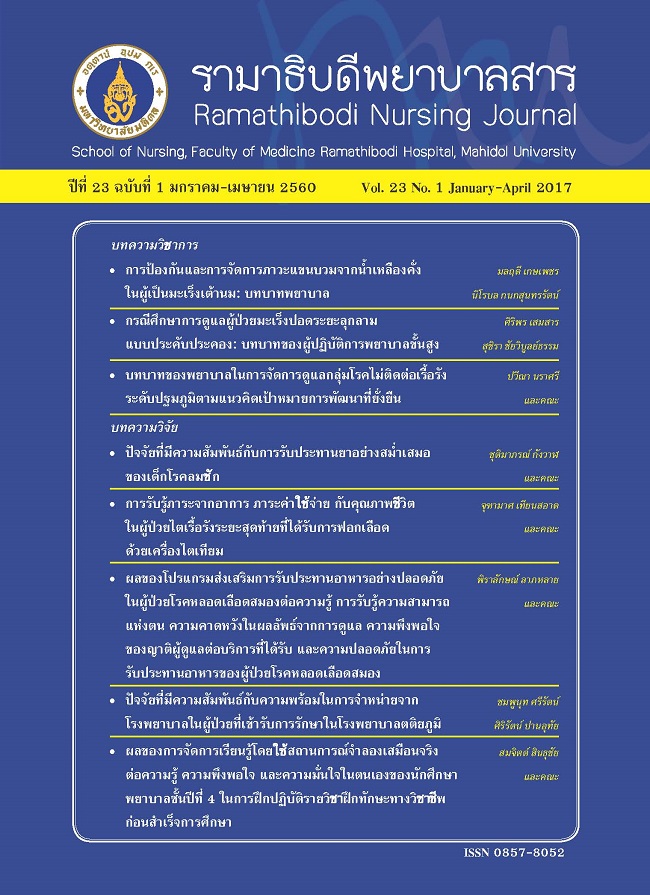Effects of High-Fidelity Simulation Based Learning on Knowledge, Satisfaction, and Self-Confidence among the Fourth Year Nursing Students in Comprehensive Nursing Care Practicum
Main Article Content
Abstract
บทคัดย่อ: การวิจัยนี้มีวัตถุประสงค์เพื่อศึกษาผลของการจัดการเรียนรู้ด้วยสถานการณ์จำลองที่เสมือนจริง ต่อความรู้ ความพึงพอใจ และความมั่นใจในตนเอง ของนักศึกษาพยาบาลวิทยาลัยพยาบาลบรมราชชนนี สระบุรี จำนวน 69 คน สุ่มกลุ่มตัวอย่างแบบง่าย ได้กลุ่มทดลองจำนวน 35 คน และกลุ่มควบคุม 34 คน ดำเนินการสอนกลุ่มทดลองด้วยสถานการณ์จำลองที่เสมือนจริง ส่วนกลุ่มควบคุมสอนปกติตามหลักสูตร เครื่องมือที่ใช้ในการวิจัย ประกอบด้วยแบบวัดความรู้ ความพึงพอใจ และความมั่นใจในตนเอง สถิติที่ใช้ในการวิเคราะห์ข้อมูล ได้แก่ ร้อยละ ค่าเฉลี่ย ส่วนเบี่ยงเบนมาตรฐาน และการทดสอบค่าที ผลการวิจัยพบว่า 1) นักศึกษาพยาบาลที่ได้รับการสอนด้วยสถานการณ์จำลองที่เสมือนจริงมีคะแนนเฉลี่ยความรู้ ความพึงพอใจ และความมั่นใจในตนเองหลังทดลองสูงกว่านักศึกษาพยาบาลที่เรียนด้วยวิธีปกติอย่างมีนัยสำคัญทางสถิติ และ 2) นักศึกษาพยาบาลที่ได้รับการสอนด้วยสถานการณ์จำลองที่เสมือนจริงมีคะแนนเฉลี่ยความรู้ ความพึงพอใจ และความมั่นใจในตนเองหลังทดลองสูงกว่าก่อนทดลองอย่างมีนัยสำคัญทางสถิติ ผลการสนทนากลุ่มพบว่านักศึกษาที่เรียนรู้ด้วยสถานการณ์จำลองที่เสมือนจริงสะท้อนว่า ได้รับความรู้จากการเรียนเรื่อง หลักการประเมินสภาพ การดำเนินของโรค การรักษาและการพยาบาล การให้ยา ซึ่งความรู้เหล่านี้ผู้เรียนสะท้อนว่า สามารถจดจำได้นาน ส่วนความพึงพอใจ ประสบการณ์จากการเรียนรู้ด้วยสถานการณ์จำลองที่เสมือนจริงทำให้ผู้เรียนพึงพอใจในเรื่องการคิด และการตัดสินใจที่เร็วขึ้น และ นักศึกษาส่วนใหญ่มีความมั่นใจในการปฏิบัติการพยาบาลมากขึ้นโดยเฉพาะในเรื่อง การประเมินสภาพ การลำดับความสำคัญของการพยาบาล การให้ยา และการรายงานแพทย์โดยใช้เทคนิคการกำหนดกรอบการสนทนาเพื่อให้ข้อมูลเกี่ยวกับผู้ป่วยที่กระชับ รวดเร็ว และครอบคลุมสิ่งที่จำเป็น (SBAR) ซึ่งประกอบด้วย 1) สถานการณ์ที่ต้องรายงาน 2) ภูมิหลังเกี่ยวกับสถานการณ์ 3) การประเมินสถานการณ์ และ 4) ให้ข้อเสนอแนะ ผลการวิจัยนี้เป็นข้อมูลสนับสนุนในการส่งเสริมการจัดการเรียนรู้ด้วยสถานการณ์จำลองที่เสมือนจริงสำหรับนักศึกษาพยาบาล
Abstract:The purpose of this study is to determine the effect of high fidelity simulation based learning on knowledge satisfaction and self-confidence among nursing students of Boromarajonani College of Nursing, Saraburi. The samples were randomized into two groups, 35 nursing students in a treatment group and 34 nursing students in a control group. The treatment group was taught by the high fidelity simulation based learning whereas the control group was taught by the regular method of curriculum. Instruments used in this study comprised knowledge test and Student Satisfaction and Self-Confidence in Learning Scale. Percentage, mean, standard deviation, and t-test were employed to analyze data. Results of this study showed that 1) the treatment group showed significantly higher mean score of knowledge, satisfaction, and confidence than the control group after experiment and 2) mean score of knowledge, satisfaction, and confidence of the treatment group after experiment were significantly higher than the score before experiment. Results of focus group showed that the treatment group obtained knowledge about assessment, progression of disease, treatment, drug, and nursing care. The students in treatment group reflected that they can remember the knowledge for a long time, have satisfaction and confidence helping them to think and make decision quickly. Moreover, most students had been more confident to perform nursing assessment, setting priority of nursing care, drug used and and using communication technique called SBAR; Situation, Background, Assessment and Recommendation. The results of this study can be used for promoting high fidelity simulation based learning for nursing students.
Article Details
บทความ ข้อมูล เนื้อหา รูปภาพ ฯลฯ ที่ได้รับการตีพิมพ์ในรามาธิบดีพยาบาลสาร ถือเป็นลิขสิทธิ์ของวารสาร หากบุคคลหรือหน่วยงานใดต้องการนำทั้งหมดหรือส่วนหนึ่งส่วนใดไปเผยแพร่หรือเพื่อกระทำการใด ใด จะต้องได้รับอนุญาตเป็นลายลักษณ์อักษรจากรามาธิบดีพยาบาลสารก่อนเท่านั้น


